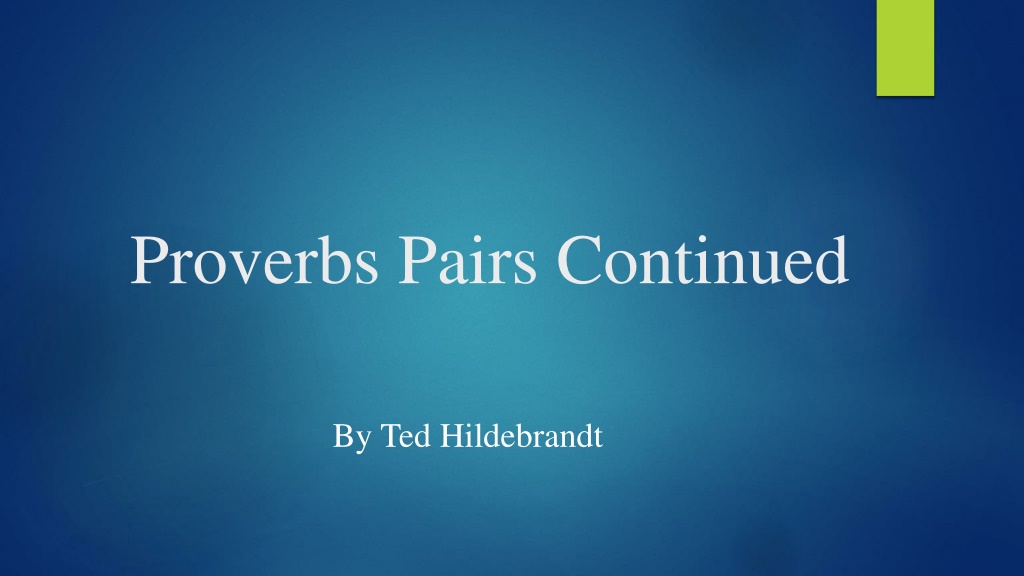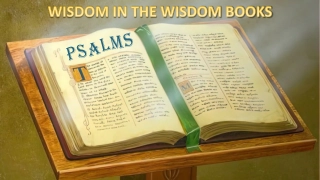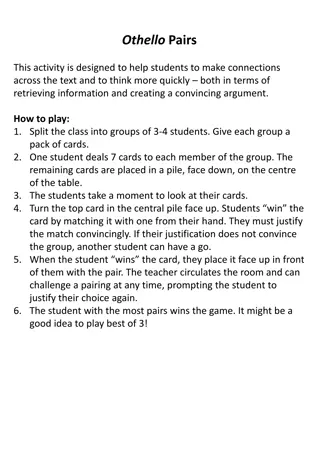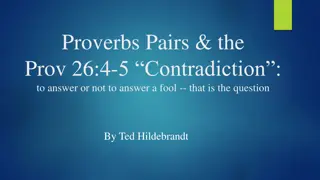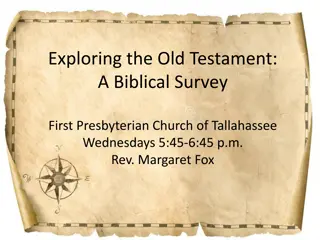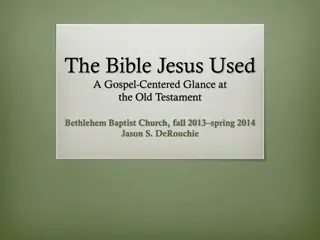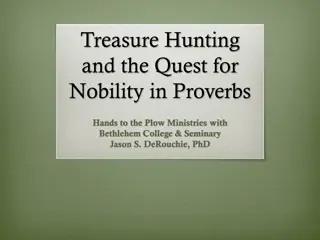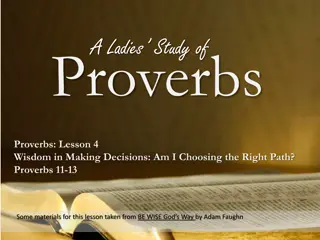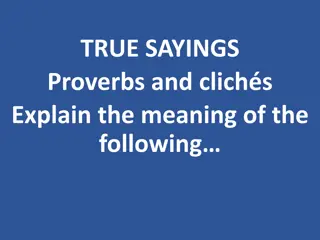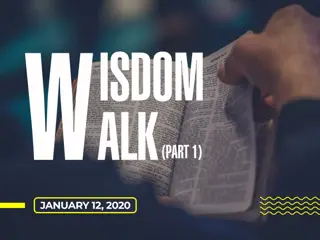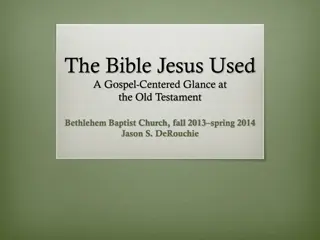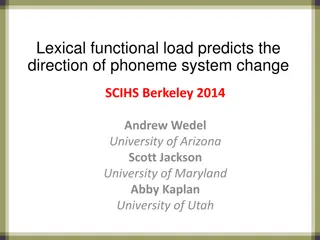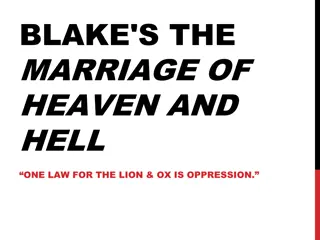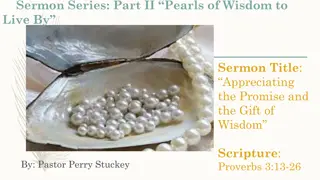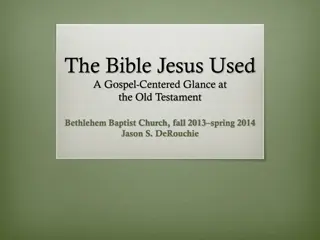Proverbial Pairs in the Book of Proverbs
Delve into the organization and interpretation of proverbial sayings in the Book of Proverbs, examining the context, grouping, and intent behind the collection. Discover prevalent pairs, cohesive variations, and modern twists on traditional proverbs like "Absence makes the heart grow fonder" versus "Out of sight, out of mind."
Download Presentation

Please find below an Image/Link to download the presentation.
The content on the website is provided AS IS for your information and personal use only. It may not be sold, licensed, or shared on other websites without obtaining consent from the author.If you encounter any issues during the download, it is possible that the publisher has removed the file from their server.
You are allowed to download the files provided on this website for personal or commercial use, subject to the condition that they are used lawfully. All files are the property of their respective owners.
The content on the website is provided AS IS for your information and personal use only. It may not be sold, licensed, or shared on other websites without obtaining consent from the author.
E N D
Presentation Transcript
Proverbs Pairs Continued By Ted Hildebrandt
Introducing Proverbs Tim Mackie the Bible Project 5 minute intro to Proverbs Fred Putnam 4 lectures Introducing Proverbs Knut Heim (20 lectures on Prov.) Gus Konkel (22 lectures on Prov.) Dan Treier 4 lectures on Proverbs for Christian Living Kyle Dunham 2 lectures on the structure of Proverbs Going to Biblicalelearning.org for thousands of pages of books/art. My presentations on Prov. 26:4-5 and Proverbs are Different
Introducing Proverbs Pairs: Questions Are the proverbial sayings in Prov. 10-29 just thrown together or is there some order there? What does context mean when it comes to proverbial sayings? When we interpret proverb sayings, should we use the proverbs around them to help us gain a better understanding of the proverb? Did those who collected the proverbial sayings group them in ways that help us understand them better? Author intent/collector intent? How did the collectors bind the proverbial sayings?
Proverb Pairs prevalence 62 examples [124 verses out of 568 in Prov 10-29, 21%] Listing of Proposed Pairs: 10:2-3, 4-5, 15-16, 25-26, 31-32; 11:5-6, 16-17; 12:15-16, 18-19; 13:2-3, 7-8, 21-22; 14:20-21, 26-27; 15:1-2, 8-9, 13-14, 16-17, 20-21; 16:12-13, 18-19; 17:27-28; 18:10-11, 18-19, 20-21; 19:13-14, 28-29; 20:16-17; 21:25-26, 30-31; 22:22-23, 24-25, 26-27; 23:13-14, 15-16, 17-18, 20-21, 24-25; 24:1-2 3-4, 8-9, 13-14, 19-20, 21-22, 28-29; 25:2-3 4-5, 6-7, 9-10, 11-12, 13-14, 16-17, 21-22; 26:4-5, 18-19, 20-21; 27:1-2, 3-4 15-16, 25-26; 28:25-26; 29:2-3
5 Other cohesive variations 1) triads Prov. 23:26-28; 24:10-12; et al. 2) detached pairs 10:8/10; 16:32/17:1; 17:26/18:5; 18:23/19:1 et al. 3) Pair Plus One Detached: Prov. 15:1-2, 4; 15:8-9, 11; 20:16-17, 20; 20:29-30, 27; 10:25-26, 23 4) Pairs plus one: Prov. 10:16-17, 18; 15:16-17, 15; 15:31-32, 30; 18:6-7, 8; 23:20-21, 19 5) Strings/Clusters Prov. 11:9-12; 15:29-33 et al. vid. Knut Heim Like Grapes of Gold Set in Silver, Poetic Imagination in Prov.
Review on pair #1 [Prov 26:4-5] See previous video. Modern Contrary Proverbs Absence makes the heart grow fonder/wander Contra: Out of sight, out of mind. Early bird gets the worm; Contra: second mouse gets the cheese. Look before you leap, Contra: he who hesitates is lost. Wolfgang Mieder. Twisted Prov. Prov 26:4 Answer not a fool according to his folly, lest you be like him yourself. concern is your own damage. Prov 26:5 Answer a fool according to his folly, lest he me wise in his own eyes. -- concern is for the fool himself getting worse
Conclusion on pair #1 [Prov 26:4-5] Hoglund concludes: (346; van Heerden, 611) To enter into dialogue with the fool is both an obligation and a threat for the wise. Thus Proverbs 26:4-5 for a proverb pair intentionally concatenated to push the wise toward higher order thinking, imagination, using the proverbial pair with its repetition and with a certain amount of playfulness and parody to accomplish the collector s purpose of thinking more deeply about what is fitting in dealing with a fool (Prov 26:1-12).
Prov. 15:8-9 a syntactically bonded pair The sacrifice of the wicked (pl.), an abomination to the Lord, but the prayer of the upright (pl.) is his delight. An abomination to the Lord, the way of the wicked (sg.), but the one (sg.) pursuing righteousness he loves.
Pair #2: Prov. 15:8-9 a syntactically bonded pair / / an abomination to the Lord / the sacrifice of the wicked (pl.) but the prayer of the upright (pl.) / his delight / the way of the wicked (sg.) / An abomination to the Lord, but the one (sg.) pursuing righteousness / he loves. /
Prov. 15:8-9 a syntactically bonded pair Following the Hebrew tightly: The sacrifice of the wicked ones (pl.) an abomination to the Lord, but the prayer of the upright ones (pl.) is his delight. An abomination to the Lord, the way of the wicked one (sg.), but the one (sg.) pursuing righteousness he loves. Way of the wicked sg. here (5x all other times wicked pl.) Ps. 1:6; 146:9; Prov 4:19; 12:26; Jer. 12:1. Compare translations: ordering and singular/plural.
Prov. 15:8-9 translations The sacrifice of the wicked ones (pl.) an abomination to the Lord, but the prayer of the upright ones (pl.) is his delight. An abomination to the Lord the way of the wicked one (sg.), but the one pursuing righteousness (sg.) he loves. NIV: The LORD detests (verb) the sacrifice of the wicked (sg or pl?), but the prayer of the upright (sg. or pl.?) pleases him. The LORD detests the way of the wicked (sg. or pl.?) but he loves those (pl. no?) who pursue righteousness.
Prov. 15:8-9 translations The sacrifice of the wicked ones (pl.) and abomination to the Lord, but the prayer of the upright ones (pl.) is his delight. An abomination to the Lord the way of the wicked one (sg.), but the one pursuing righteousness (sg.) he loves. ESV: The sacrifice of the wicked (sg. or pl.?) is an abomination to the LORD, but the prayer of the upright (sg. or pl.?) is acceptable to him. The way of the wicked (sg. or pl.?) is an abomination to the LORD, but he loves him (sg. yes) who pursues righteousness.
Cohesion Both Yahweh sayings check how many times there are two YHWH sayings in a row (how many total YHWH sayings also) 87x in Prov.; 15x in adjacent verses. Both have the catch-words: an abomination to the Lord ( Abomination/detests : [also 15:26] ) Phrase ( abomination to the Lord ) 11x in Prov. yet here two in a row (only time back to back), [others: 3:32; 11:1, 20; 12:22; 15:26; 16:5; 17:15; 20:10, 23] 15:8, 9 proverb pair Special: only one other time is this phrase (abomination to the Lord) used with wicked (Prov 17:15) yet two in a row here in 15:8-9
Prov. 15:8-9 a syntactically bonded pair Both have wicked constructed with another noun Chiastic linking: ABBA -- letter Chi in Greek sacrifice of wicked ones (A) + A B Lord s abomination (B) (15:8a) Lord s abomination (B ) + B A way of the wicked one (A ) 15:9a Second cola: prayer of upright ones + pleases him (15:8b) one pursuing righteousness + he loves (15:9)
Prov. 15:8-9 a syntactically bonded pair Syntactically Both first cola are verbless clauses Both first cola share Item (sacrifice/way) + character (wicked) Both have 2 -- 2 unit Noun Phrases 8a / 9a sacrifice of wicked / abomination to the Lord // abomination to the Lord / way of wicked) -- AB/BA chiasm 8b / 9b both pronominalize back to Yahweh in the first cola both indicate God s approval [pleases him/he loves] Theme: both address what displeases and pleases Yahweh
Cohesion: Prov 15:8-9 Settings may be quite diverse (cultic / wisdom) Pair: character trumps cultic acts; disgusts Him when wicked do pious/cultic acts Character elicits a response from God Sacrifice/prayer to the larger direction of one s life (way of wicked/pursuing righteousness) Sacrifice (5x in Proverbs always neg. 7:14; 21:27- couples it with abomination. non-cultic aspect of wisdom [temple/-sacrifices/feasts/priests/exodus/history absent] Prayer (3x in Prov.) positive=15:8, 29; neg.= 28:9 (abomination)
Prov. 15:8-9 a syntactically bonded pair Separateness from surrounding verses Pr. 15:7 loaded with wisdom terms yet no overlap with vs. 8-9 The lips of the wise spread knowledge, but the heart of fools is not so 15:7 is verbal not = verbless clauses of 15:8a, 9a. 15:10, 7 no reference to Yahweh, normal wisdom discipline and its reception Stern discipline awaits anyone who leaves the path; the one who hates correction will die.
Hermeneutical significance of placing Prov. 15:8 and 9 together Emphasis on the things the Lord detests (sacrifice of wicked / way of the wicked). First one more cultic, second more wisdom but either way the Lord s response to the character--sacrifice or way of the wicked. Prayer of the upright and the pursuits of the righteous please Him. Character over cultic acts. Ways/pursuits of a person s life determined by character: character consequence. God s engagement, evaluation and personal response based on character more than religious or cultic behaviors or pursuits which reflect character. He sees through hypocrisy i.e. he is wise. Expansion from cultic acts (cf. prophets obey over sacrifice type statements) expanded into ways and pursuits wisdom more broad.
Pair #3: Prov. 10:15-16 Non-catchword pair The wealth of the rich one is his fortified city, but poverty is the ruin of the poor ones. The wages of the righteous one is life, but the income of the wicked one is punishment.
Pair #3: Prov. 10:15-16 Non-catchword pair but poverty is the ruin of the poor The wealth of the rich is their fortified city, NIV the poverty of the poor is their ruin. A rich man s wealth is his strong city; ESV but the earnings of the wicked is punishment The wages of the righteous is life NIV the gain of the wicked to sin. The wage of the righteous leads to life ESV
Prov 10:15-16 Non-catchword pair Cohesion: Not a single word repeated in this pair even with high frequency words (righteous, wicked) and abundance of economic terms yet no repetition (wealth [15a], rich [15a], poverty [15b], poor [15b], wages [16a], income [16b]) Syntactially 15a/b and 16 a/b are all verbless clauses
Prov 10:15-16 Non-catchword pair Subjects in all four: NP = N:It [wealth related] + N:Possessors In 15 possessors = economic status // 16 possessors= moral Shared theme economic and its impact. Positive evaluation of economic impact (15a/16a) followed by a negative impact (15b/16b) Separate: 10:13-14 about speech; verbal clauses; Not = verbless clauses of 10:15-16. 10:17 linked by catchword but not tight Hermeneutics: benefits of rich (15) but then the paired verse qualifies it with moral categories. Two well coupled
Prov. 13:21-22 positionally cohesion 13:21 Disaster pursues sinners, but the righteous are rewarded with good. 13: 22 A good man leaves an inheritance to his children s children but the sinner s wealth is laid up for the righteous. ESV cf. NIV Mine: -- Hidden in the Hebrew is the inclusion and chiasm ABBA Sinners disaster pursues, but the righteous are rewarded with good things. A good man leaves an inheritance to his grandchildren, but stored up for the righteous is the wealth of the sinner.
Prov. 13:21-22 positionally cohesion Sinners -- trouble pursues but the righteous are rewarded with good [prosperity] A good [person] leaves an inheritance for their children s children, but stored up for the righteous is the wealth of the sinner.
Prov. 13:21-22 positionally cohesion Sinners -- trouble pursues, but the righteous are rewarded with good [things]/prosperity. A good [person] leaves an inheritance for their children s children, but stored up for the righteous is the wealth of the sinner. Cohesion There is an inclusio (enveloping) with 21a beginning with sinners and 22b ending with sinner both from the same root ( ) 21b ends with good (tov) and 22a begins with good ( )
Prov. 13:21-22 positional cohesion The initial and final words: Chiasm Greek ordering A 13:21a sinners [ ] initial word B21bgood [ ] final word B 13:22a good [ ] initial word A 22b sinner [ ] final word in exactly initial and ending positions makes the cohesional forces strong
Thoughts 21a/b are both: Object Verb Subject // Object Verb Subject OVS/OVS O:N:Experiencer:sinners + V:Active:pursue + S:N:Reward:calamity O:N:Experiencer:righteous(pl) + V:Active:reward +S:N:Reward:prosperity 22 a/b S:Good+ V:leave inheritance + O:NP:Exper:children s children SVO V:Pass:stored up + PP:Exp:for righteous + O:NP:Reward: wealth of sinner VPO Hermeneutics: Therepetition of the word as the last word in 21b meaning prosperity is interestingly repeated opening 22a but meaning good character. Thus calling the reader to a careful consideration of these identical words with variation in meaning. Reward to the righteous is the sinner s wealth (great reversal; fleeting/lasting also highlighted).
Prov. 13:21-22 positionally cohesion 22b places the subject last which facilitates the inclusio with sinners This pair features first and last positions. Separate from 13:20 character shaping impact of associates: 20Whoever walks with the wise becomes wise, but the companion of fools will suffer harm 13:23 economics: 23 The fallow ground of the poor would yield much food, but it is swept away through injustice.
Prov 15:1-2 Thematically linked pair A gentle answer turns away wrath, but a harsh word stirs up anger. The wise tongue commends knowledge, but the mouth of fools pour out folly. No shared catchwords even though there are high frequency words (wise, fools, mouth, tongue, word, wrath). Both address: the power of speech theme
Prov 15:1-2 Thematically linked pair but a harsh word stirs up anger.A gentle answer turns away wrath, but foolish mouth gushes folly. The wise tongue commends knowledge,
Prov 15:1-2 Thematically linked pair Syntactic isomorphism with the two verses: SVO/SVO // SVO/SVO Subj:NP [N+Qual] + Verb:Hi/Impf. + Obj:N Gentle answer turns away wrath Hard word stirs up anger Wise tongue commends knowledge Foolish mouth gushes folly 15:1 speech act +/- emotional result +/- 15:2 character speech +/- wisdom result +/- Separate: 14:35 servant s relationship to king; 15:3 Yahweh saying
Exploring others cohesive Paring techniques Very Low frequency catch words: Prov 26:20-21 [ (wood), (fire)] shows no collectional coincidence but intentional juxtaposing forming the pair as these two words are found almost no where else in Proverbs yet juxtaposed into a proverb pair only here. 26:20 For lack of wood the fire goes out, and where there is no whisperer, quarreling ceases. 21 As charcoal to hot embers and wood to fire, so is a quarrelsome man for kindling strife.
Exploring others cohesive Paring techniques Multi-catchwords: 14:26-27; 15:8-9; 23:13-14; 23:24-25; 26:20-21 14:26 In the fear of the Lord one has strong confidence, and his children will have a refuge. 27The fear of the Lord is a fountain of life, that one may turn away from the snares of death. Only 9x in Prov 10-29 (568 verses) but only here back to back in a proverb pair not luck/coincidence but intentional placing by editors
Exploring others cohesive Paring techniques Catch-words binding the pair together: Abomination 15:8-9; strong 18:10-11; imbibe (23:20-21) Separate 25:4-5; gold 25:11-12; wood 26:20-21 Trust 28:25-26 searching 25:2-3 fruit 18:20-21 Multi-catchword phrases Wealth/wages/income (10:15-16) tongue/lips/mouth 10:31-32 Grace/lovingkindness 11:16-17 hatred/despise 14:20-21 Love/kindness 14:20-21 lacking judgment/fool 15:20-21 Pride/haughty 16:18-19 happy/rejoice 23:15-16
Exploring others cohesive Paring techniques + prohibition, + explanation Rhetorical devices: 24:1-2; 15-16, 19-20; 22:24-25; 23:18-19, 20-21 nor desire to be with them, 24:1-2 Be not envious ( ) of evil men, [prohibition] 2For ( ) their hearts devise violence, [explanation] and their lips talk of trouble. Clear pairing
Exploring others cohesive Paring techniques Two Better than proverbs linked 15:16-17 (18x Pr. 10-29 only here paired) 15:16 Better is a little with the fear of the Lord than great treasure and trouble with it. 17Better is a dinner of herbs where love is than a fattened ox and hatred with it Two simile proverbs linked obscured in translation ) the tempest passes, the wicked is no more but the righteous is established forever. -- both word initial position starting with ) to the teeth and smoke to the eyes, so is the sluggard to those who send him. 10:25When ( 26Like vinegar (
Exploring others cohesive Paring techniques Syntactic cohesion: Dependence and linking particles: 24:17-18 17Do not rejoice ( ) when your enemy falls, and let not your heart be glad when he stumbles, 18Lest ( ) the Lord see it and be displeased and turn away his anger from him. Back referencing by pronominal suffix 24:17-18; 22:27; 23:14; 24:22
Exploring others cohesive Paring techniques Shared medial vav (10:25a/26a; 27:3a/4a and 15:16b/17a 27:3A A stone is heavy, and ( ) weighty is sand, -- vav (and) in the middle of a colon/line is rare in Proverbs 27:4A Wrath is cruel, [and] ( ) overwhelming is anger, -- translation skipped the and in the Hebrew when the ESV translated it into English Shared NP construction: mouth part (tongue/lips/tongue + character quality (wise/true/false). 12:18-19
Exploring others cohesive Paring techniques Thematic cohesion: 11:5-6; 16:12-13; 10:2-3; 11:5 The righteousness of the blameless keeps his way straight, but the wicked falls by his own wickedness. 11:6 The righteousness of the upright delivers them but the treacherous are taken captive by their lust. 10:2 Treasures gained by wickedness do not profit, but righteousness delivers from death. 10:3 The LORD does not let the righteous go hungry, but he thwarts the craving of the wicked.
Summary/Conclusion Willy-nilly advocates many say no connections between sayings/proverbs in Prov. 10-29 62 pairs (124 verses out of 568 (Prov 10-29; 21%) 5 pairs examined in detail: 26:4-5; 15:8-9; 10:16-17; 13:21- 22; 15:1-2 then explored other bonding/cohesive techniques Conclusion: This discussion has exposed the hand of the editor above the single proverb level. Thus there is meaning both on the says/sentential level of a single proverb and its author and ALSO Meaning connection at the collection level pairs that are linked together by the editor (cf. 25:1)
Summary/Conclusion Hermeneutics: when reading sentential saying proverbs be aware and look for pairing and the interaction between paired proverbs Authorial intent (yes, who is the author of a proverb) but also collector/editor intent needs to be considered as well in the interaction of proverbial sentences with their paired unit. Keep your eyes open for proverbial pairing
